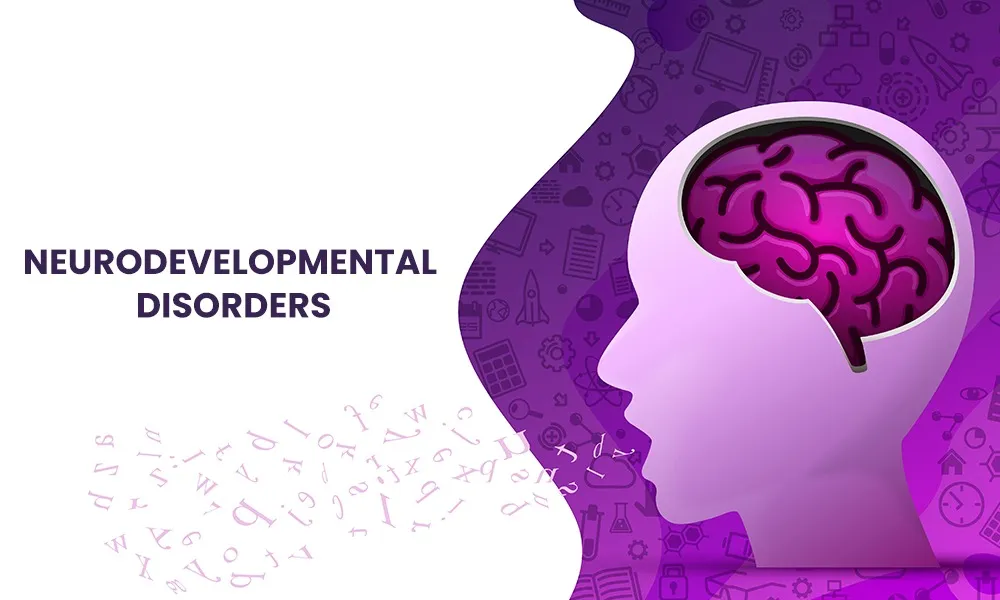
Neurodevelopmental Disorders
Neurodevelopmental disorders are a group of conditions that affect the growth and development of the brain and nervous system. These conditions usually begin in childhood and can influence behavior, learning, communication and motor skills. When asked to define neurodevelopmental disorder, experts explain it as impairments in brain function that interfere with daily life and social interaction.
Prevalence studies in India show that neurodevelopmental disorders affect approximately 0.80% (1 in 125) of the general population, and 1.38% (1 in 72) of children under 12 Years.
Common Types of Neurodevelopmental Disorders
Below are some of the most recognised neurodevelopmental disorders, each affecting cognitive, emotional or social functioning in unique ways:
- Autism Spectrum Disorder (ASD): Impacts social interaction, communication and behavior patterns.
- Attention-Deficit/Hyperactivity Disorder (ADHD): Characterised by difficulties with attention, impulsivity and hyperactivity.
- Intellectual Disability: Involves below-average intellectual functioning and challenges in daily life skills.
- Specific Learning Disorders: Affect skills like reading, writing or mathematics (e.g., dyslexia, dysgraphia & dyscalculia).
- Communication Disorders: Include speech, language or social communication difficulties.
- Motor Disorders: Involve problems with coordination or repetitive, involuntary movements (e.g., developmental coordination disorder & Tourette syndrome).
The most common neurodevelopmental disorders among children are intellectual disability (20.9%), ADHD (17.6%), vision impairment (14.3%), autism spectrum disorders (13.2%), communication disorders (13.2%), and hearing loss (9.9%).
What Causes Neurodevelopmental Disorders?
The causes of neurodevelopmental disorders are not fully understood, but research points to a combination of genetic, environmental and biological factors. Prenatal exposure to toxins, premature birth, low birth weight and family history of mental health conditions are considered risk factors. Brain structure abnormalities also play a role in the development of these conditions.
Early Signs and Symptoms of Neurodevelopmental Disorders
Recognising neurodevelopmental disorders symptoms at an early stage is crucial. Signs can include delayed speech, difficulty in social interaction, trouble with concentration, repetitive behaviors and challenges in learning. Children may struggle with adapting to routines and their developmental milestones may be slower compared to peers.
Diagnosis and Screening of Neurodevelopmental Disorders
Early diagnosis can significantly improve outcomes. Specialists use developmental screenings, behavioral assessments and standardised tests to evaluate children. Parents and teachers often provide key observations, as signs of neurodevelopmental disorders usually appear in school or home settings. Accurate diagnosis requires a multidisciplinary team, including psychologists, pediatricians and speech therapists.
Treatment and Management Options of Neurodevelopmental Disorders
The treatment of neurodevelopmental disorders depends on the specific condition and severity of symptoms. Approaches may include behavioral therapy, speech and language therapy, occupational therapy, special education support and in some cases, medication. Personalised intervention plans help individuals build communication, learning and coping skills, improving their quality of life.
Facts About Neurodevelopmental Disorders
- Neurodevelopmental disorders often continue into adulthood if left untreated.
- Early intervention can improve social and learning outcomes significantly.
- ADHD is one of the most commonly diagnosed neurodevelopmental conditions worldwide.
- Autism spectrum disorder affects about 1 in 100 children globally.
- Support from family and educators is essential for long-term progress.
Impact on Daily Life and Families
Living with neurodevelopmental disorders can be challenging for individuals and their families. Parents may struggle with understanding their child’s needs, while children often face difficulties in school and social settings. Emotional support, inclusive education and access to therapy can help families manage these challenges effectively.
Supporting Children with Neurodevelopmental Disorders
Creating a supportive environment at home and school is key. Children benefit from structured routines, clear communication and positive reinforcement. Teachers trained to recognise signs of neurodevelopmental disorders can adjust teaching methods, ensuring every child has an equal chance to learn and grow.
Why Early Intervention Matters
Timely support can change the trajectory of a child’s life. Early identification of signs of neurodevelopmental disorders allows healthcare providers to begin therapies that reduce long-term challenges. When children receive targeted care in their formative years, their chances of developing independence and confidence increase significantly.
The Role of Mental Health Platforms
Today, access to mental health professionals is easier through online platforms. Parents and individuals can connect with experts who specialise in treating neurodevelopmental disorders. These services provide therapy, counseling and continuous support that might not always be available in local communities.
How Mindsy Can Help?
Mindsy is a trusted platform that connects families with licensed psychologists who specialise in neurodevelopmental disorders. From identifying early signs to designing effective therapy plans our experts provide personalized support that addresses each child’s unique needs, making mental health care approachable and reliable.
With online consultations and app-based support, Mindsy ensures professional help is always accessible. Parents can seek guidance, monitor progress and receive continuous care without barriers of distance or time. By bridging families and professionals, Mindsy empowers children to thrive while giving parents the confidence of expert-led support whenever they need it.
FAQ’S
1. What causes neurodevelopmental disorders in children?
Causes can include genetic factors, prenatal complications, low birth weight or environmental influences such as exposure to toxins.
2. Can neurodevelopmental disorders be cured?
They cannot be “cured” in the traditional sense, but early intervention, therapy and support can significantly improve quality of life.
3. At what age do signs of neurodevelopmental disorders appear?
Symptoms can be noticed as early as infancy or toddler years, often around 2–3 years of age, depending on the condition.
4. How do I know if my child needs professional help?
If your child shows consistent delays in speech, social skills, learning or struggles with behavior and routines, it’s best to consult a psychologist.
5. Are neurodevelopmental disorders the same as mental illnesses?
No. While both affect the brain, neurodevelopmental disorders primarily impact growth and development, while mental illnesses usually arise later in life.
